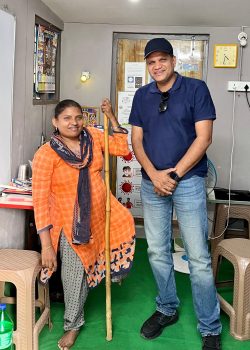
Empowering entrepreneurship to advance inclusivity and deliver greater value
Kiran Pedada publishes FT50 research studying women rural microentrepreneurs in India
For Asper School of Business professor Kiran Pedada, rigorous and thorough academic research is also personal, passionate, and a way to broaden perspectives.
Pedada (Assistant Professor of Marketing and The Associates Fellow in Marketing and Inclusive Business), recently published a study in the FT50-ranked Journal of the Academy of Marketing Science.
The paper, “Rural women microentrepreneurs, consumer acquisition, and value delivery,” examines how recruiting women entrepreneurs living in rural India can aid in consumer acquisition and value delivery, finding that rural areas with more women than men microentrepreneurs experienced a 40.8% increase in consumer acquisition and delivered 64.1% greater value to consumers.
Undertaken with co-authors Aindrila Chatterjee and Amit J. Chauradia, Pedada describes the study as a highlight of his career so far, emphasizing how much the subject resonates with his own background.
“I personally came from one of these rural villages, and I witnessed many of the challenges that rural women face. I immediately jumped at the opportunity to work on this project because it is very close to my heart,” he explains.

Pedada and one of the entrepreneurs working with DEF.
Using data from the Digital Empowerment Foundation (DEF), a large NGO based in India that strives to empower rural villages with digital technologies, Pedada examined the work of rural women microentrepreneurs. With the support of DEF, these small business owners connect rural consumers to information about welfare programming offered by the government, bringing more consumers out of digital darkness and helping them access crucial resources.
Pedada studied the effects of recruiting more rural women microentrepreneurs for DEF and speaks with pride about the key findings.
“First, we found that the rural locations with more women microentrepreneurs delivered more value and consumer acquisition. The second finding is that these women can also deliver better value to women consumers specifically. The third finding, which we are very proud of, is that not only are these women creating more value in their own work, but it seems that their passion and commitment is contagious,” he notes.
To this point, the research shows that men microentrepreneurs working in these inclusive settings with more women microentrepreneurs delivered greater value to their consumers than those working in predominantly male work environments.
This research is a source of personal and professional pride for Pedada, as he explains that it combines his core research interests—emerging markets, digital environments, and the intersections of marketing and finance. He also hopes it can broaden perspectives and inspire more work that examines inclusive practices that might be taking place on demographic or geographic fringes.
“Given the increasing importance and interest in the UN Sustainable Development Goals—accessibility, gender equity—I think this kind of work is going to be more and more relevant. The most important thing is that we leverage our research toolkit and training rigorously in pursuit of underexamined areas,” he says.
Pedada’s work in this and, he explains, future research wants not just to rethink a concept like entrepreneurship, but instead strives to think bigger about what entrepreneurship is—who can become an entrepreneur and how that identity can be a source of personal and community empowerment and a compelling value proposition for businesses.
—
Asper School of Business aims to expand global knowledge and engage in intellectual exploration to advance teaching, learning and research with an intent to advance and explore equity, diversity, and inclusion. Learn more about the Master of Science (MSc) and PhD in Management programs at the Asper School of Business.
By signing into a UM Libraries account, interested readers can access Pedada’s article here.






